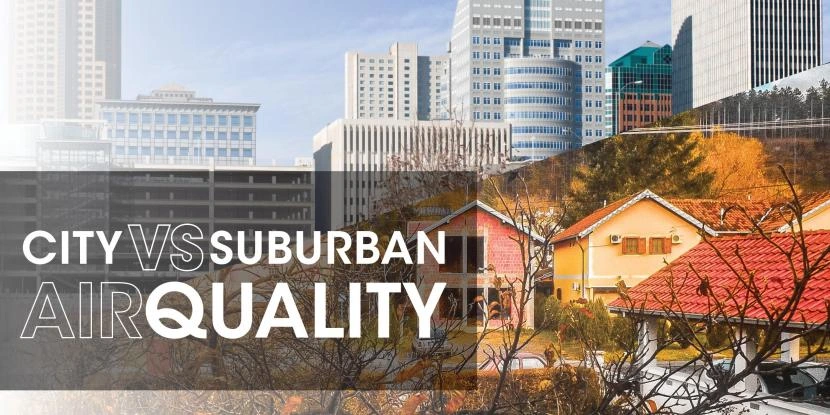City vs. Suburban Air Quality

Where is it healthier to live, in the city or the suburbs? You need to take many factors into account to answer this question completely, but first consider a comparison between air quality in the city and the suburbs.
What comes to mind when you picture pollution within a city? Sooty exhaust from thousands of cars zooming up and down the streets is a likely image. While vehicle exhaust is a bigger source of pollution in the city compared to the suburbs, it’s not even close to the biggest factor contributing to poor air quality in inner city homes.
Since you spend a vast majority of your time inside, the indoor air quality has a far bigger impact on your health than the number of cars driving around outside. Consider what impacts air quality in city and suburban environments and how to keep the air in your home cleaner.
What Impacts Air Quality
In a study published in the Journal of Urban Health in 2007, researchers compared home conditions and health outcomes in inner city Baltimore with surrounding suburbs. They concluded that inner city homes tended to have higher concentrations of airborne pollutants. Some of the pollutants that impact air quality include:
- Cigarette smoke (found in 67% of city homes vs. 5% of suburban homes)
- Gas stoves (found in 84% of city homes vs. 40% of suburban homes)
- Leaky roofs, water damage and other signs of disrepair that may indicate mould contamination (found in 77% of city homes vs. 5% of suburban homes)
- Cockroach infestation (found in 64% of city homes vs. 0% of suburban homes)
- Mouse infestation (found in 80% of city homes vs. 5% of suburban homes)
- Carpeting in the bedroom (found in 48% of city homes vs. 95% of suburban homes)
- Dust mites (found in lower concentrations in city homes)
- Allergens from cats and dogs (found in lower concentrations in city homes)
How to Clean the Air in Your Home
With so many factors affecting indoor air quality – many of which impact city homes more than suburban homes – how can you begin to clean up the air in your home? Follow these tips to help you and your family members breathe easier:
- Adjust gas appliances to decrease the amount of emissions they produce.
- Replace the HVAC system air filter so it can continue to trap allergens.
- Fix leaky pipes and roofs to discourage mould growth.
- Don’t smoke indoors and don’t allow your guests to smoke indoors.
- Remove wall-to-wall carpeting, especially in bedrooms.
- Wash bedding weekly in hot water. Encase pillows and mattresses in hypoallergenic covers.
- Keep furry pets out of the bedroom and off the furniture. If any family member has severe animal danger allergies, consider giving the pet a new home.
- Open windows and doors, weather permitting, to increase natural ventilation.
- Run the bathroom, kitchen and laundry room exhaust fan as needed to vent moist, stale air out of your home’s most polluted rooms.
- Run a tabletop air cleaner in the bedroom while you sleep.
- Install a whole-house air cleaner, which is tied into the HVAC system, for effective particle pollutant removal throughout your entire home.
- Have the ductwork cleaned to remove mould, bacteria and dust.
- Run a humidifier in the winter and a dehumidifier in the summer.
- Keep on top of household chores such as dusting, vacuuming and mopping.
Regardless of whether you live in the city or the suburbs, if you suffer from allergies or asthma, you probably want to breathe easier at home. Contact Aire Serv® for indoor air quality services and for more tips to clean your indoor air.
 Click to call
Click to call


